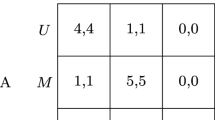Abstract
Bonanno (Logics and the foundations of game and decision theory, Amsterdam University Press, Amsterdam, 2008) provides an epistemic characterization for the solution concept of iterated deletion of inferior strategy profiles (IDIP) by embedding strategic-form games with ordinal payoffs in non-probabilistic epistemic models which are built on Kripke frames. In this paper, we will follow the event-based approach to epistemic game theory and supplement strategic games with type space models, where each type is associated with a preference relation on the state space. In such a framework, IDIP can be characterized by the conditions that at least one player has correct beliefs about the state of the world and that there is common belief that every player is rational, has correct beliefs about the state of the world and has strictly monotone preferences. Moreover, we shall compare the epistemic motivations for IDIP and its mixed strategy variant known as strong rationalizability (SR). Presuppose the above conditions. Whenever there is also common belief that players’ preferences are representable by some expected utility function IDIP still applies. But if there is common belief that players’ preferences are representable by some expected payoff function, then SR results.
Similar content being viewed by others
References
Athreya R (2001) Modelling beliefs in games with generalized preferences. In: van Benthem J (ed) Proceedings of TARK VIII (2001), Siena, pp 123–136
Aumann R (1976) Agreeing to disagree. Ann Stat 4: 1236–1239
Aumann R (1987) Correlated equilibrium as an expression of bayesian rationality. Econometrica 55(1): 1–18
Aumann R, Brandenburger A (1995) Epistemic conditions for nash equilibrium. Econometrica 63(5): 1161–1180
Battigalli P, Bonanno G (1999) Recent results on belief, knowledge and the epistemic foundations of game theory. Res Econ 53: 149–225
Bernheim D (1984) Rationalizable strategic behavior. Econometrica 52(4): 1007–1028
Bonanno G (2008) A syntactic approach to rationality in games with ordinal payoffs. In: Bonanno G, van der Hoek W, Wooldridge M (eds) Logics and the foundations of game and decision theory. Amsterdam University Press, Amsterdam, pp 59–86
Bonanno G, Nehring K (1998a) On Stalnaker’s notion of strong rationalizability and nash equilibrium in perfect information games. Theory Decis 45(3): 291–295
Bonanno G, Nehring K (1998b) Assessing the truth axiom under incomplete information. Math Soc Sci 36(1): 3–29
Börgers T (1993) Pure strategy dominance. Econometrica 61(2): 423–430
Di Tillio A (2008) Subjective expected utility in games. Theor Econ 3(3): 287–323
Epstein L, Wang T (1996) ”Beliefs about Beliefs” without probabilities. Econometrica 64(6): 1343–1373
Fagin R, Halpern J, Moses Y, Vardi M (1995) Reasoning about knowledge. MIT Press, Cambridge
Geanakoplos J (1989) Game theory without partitions, and applications to speculation and consensus. Cowles Foundation Discussion Paper, 914
Harsanyi J (1967/1968) Games with incomplete information played by Bayesian players, parts I–III. Manag Sci 14:159–182, 320–334, 486–502
Morris S (1996) The logic of belief and belief change: a decision theoretic approach. J Econ Theory 69(1): 1–23
Pearce D (1984) Rationalizable strategic behavior and the problem of perfection. Econometrica 52(4): 1029–1050
Savage L (1954) The foundations of statistics. Wiley, New York
Stalnaker R (1994) On the evaluation of solution concepts. Theory Decis 37(1): 49–74
Tan T, Werlang S (1988) The Bayesian foundation of solution concepts of games. J Econ Theory 45(2): 173–195
Author information
Authors and Affiliations
Corresponding author
Rights and permissions
About this article
Cite this article
Trost, M. Epistemic characterizations of iterated deletion of inferior strategy profiles in preference-based type spaces. Int J Game Theory 42, 755–776 (2013). https://doi.org/10.1007/s00182-011-0315-5
Accepted:
Published:
Issue Date:
DOI: https://doi.org/10.1007/s00182-011-0315-5




